More than two decades later, the Frenchman went on to become the chef de cuisine of two-Michelin-starred Le Normandie in Mandarin Oriental Bangkok — the first contemporary French restaurant in the Thai capital to clinch this accolade in 2017.
Speaking to the MICHELIN Guide Digital, the 37-year-old jolly chef credits his father, who is a gourmand, for igniting his interest in fine dining. They used to dine at one- and two-Michelin-starred restaurants as his father had friends in the restaurant industry. Dunand Sauthier says: “Thanks to my father, I could help out in the kitchens during my school holidays and I kept returning ever since.”

Finding A Sense Of Belonging In The Kitchen
He also amassed a collection of French cookbooks by legendary French chefs such as Georges Blanc and Marc Veyrat. By 10 years old, he had more than 20 cookbooks sitting on his bookshelf at home. He says with a chuckle: “While my friends played basketball, I was reading cookbooks.”
Later, the Savoie-born chef reveals that the kitchen gave him the warmth and camaraderie that was lacking in his growing up years as his parents divorced when he was very young. He says quietly: “I do not have a strong family base, but I found my family in the kitchen, especially in Michelin-starred restaurants, where they are run by huge but close-knit teams.”
Determined to pursue his dreams, he dropped out of school at 14 to take up an apprenticeship with Marc Veyrat, who is famed for his innovative cuisine that revolves around aromatic mountain plants harvested in the French Alps. That kickstarted a slew of cooking stints at Restaurant Georges Blanc in Vonnas, Maison Lameloise in Burgundy and the grand dame, Hôtel Crillon, in Paris before he landed the coveted role of managing restaurant projects for chef Guy Martin of two-starred Le Grand Véfour in Paris.
After years of opening fine-dining restaurants for Martin, Dunand Sauthier was burnt out by the arduous job, especially after a fine-dining project in Romania failed to take off. “That was a low point in my life as I lost the passion for cooking. I wanted to do something different and thought of settling down as corporate chef in a large hotel organisation.”

Starting A Fresh Chapter In Bangkok
When he took up the role chef de cuisine at Le Normandie in Mandarin Oriental Bangkok, it was his first time leaving Europe. It was also where he regained his passion for cooking as he had the opportunity to re-build the restaurant from scratch. In fact, he loves “sweating it out” on the ground as chef de cuisine so much that he decided not to progress on to the position of executive chef, which involves more management and planning operations.
He built up a brigade of young all-Thai kitchen team who had no prior experience in French food and set up his network of produce suppliers and importers. He adds: “The young Thai chefs are more motivated to learn and they are more loyal than foreign chefs.” After five years of ironing out the kinks, Le Normandie was awarded two stars in the inaugural MICHELIN Guide Bangkok selection in 2017.
He says: “I was very happy to receive the stars as it is a recognition of the hard work and sacrifices I have made. Cooking in restaurants is tough, but fine dining is even harder as you are cooking to please. My wife and kids do not lead a normal life as they hardly see me due to my long working hours.”

The accolade is also a stamp of approval for his identity and style of cuisine. He adds: “When I started out at Le Normandie, I was reproducing recipes that I have learnt from restaurants that I had worked in the past, but now I have finally come into my own.”
Having worked under the tutelage of many top French chefs, he has honed his cooking techniques under Chef Jean-François Piège at Hôtel de Crillon and Marc Veyrat, who sharpened his mastery of flavours. However, he points out that it was his stint with chef Jacques Lameloise of the three-starred Maison Lameloise, who shaped his career the most.
Hailing Lameloise as his “spiritual father”, Dunand Sauthier notes that Lameloise left an indelible mark on his cooking approach. He says: “A lot of chefs create dishes that they like to eat, but it should be about cooking for guests and being focused on getting feedback from them.” This is why Dunand Sauthier is insistent on having both a la carte and degustation menus at Le Normandie, which offer options for guests. He also gets his maître d'hôtel to follow up with guests if the food on plates is not completely polished off.
“We need to put away the notion that fine-dining is all about creating an experience. I am pretty old-school — the first purpose of diners coming to a restaurant is to eat and we need to ensure that they leave happy," he adds.
Asked about his culinary style, Dunand Sauthier confidently says: “I create a cuisine of pleasure. My dishes may appear simple but they show complexity and you know a lot of work is involved once you bite into it. I go for the precision of flavours from the produce.” He also likes to design dishes that play around with a melange of flavours, from sweetness, acidity to bitterness, to tease the palate and do justice to the ingredients.
His most popular dishes include Oscietra caviar with sea urchin and potato, yellowtail kingfish with oyster and crabmeat, and lamb allaiton with eggplant and black garlic.
Every year, he travels to France to source for about 90% of his produce, such as vegetables and seafood that are from small, organic farmers and fisherman. He adds: “I am picky about selecting produce as it forms the foundation of my cuisine.”
One of his favourite ingredients to work with is pigeon that he sources from an artisanal the South of Brittany that supplies the bird to a handful of top restaurants in France including three-starred Alain Ducasse au Plaza Athénée. He says: “I enjoy playing around with the pigeon in different seasons: during summer, I like pairing the sweetness of the melon, acidity of the timut pepper and bitterness from the rocket leaves against the plushness of the pigeon.”
Loving Asia
Dunand Sauthier, who arrived in Bangkok in 2012, is enjoying his stay so much that he sees no point in returning to Europe. He took two years to adjust to the Bangkok’s humid weather, grapple with the Thai language and getting exposed to a rich multicultural landscape.
He gushes: “Asia is full of life, whenever I go back to Europe for holidays, I feel sad as there is not much soul in the places there. In Bangkok, the street markets are so much more vibrant and the people here are more resilient and have so much more personality.”
Interview by Kenneth Goh



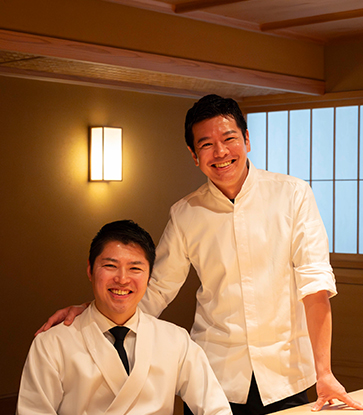





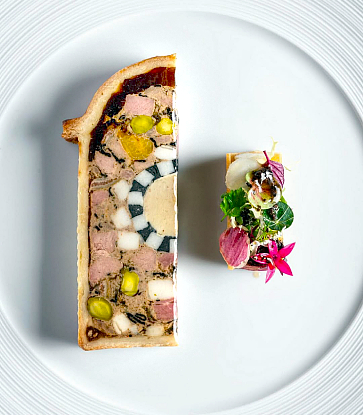
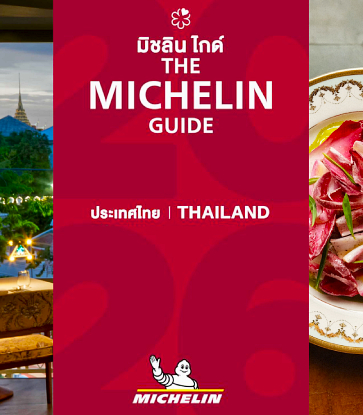
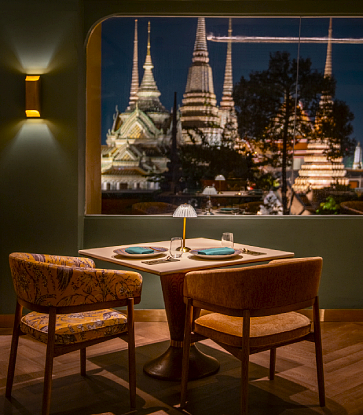
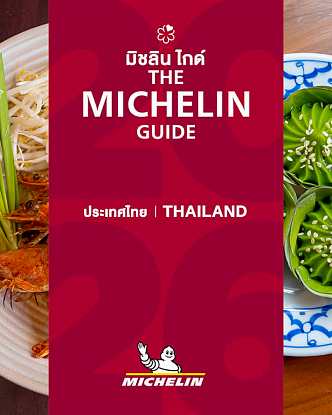

%20-%20Aman%20Nai%20Lert.jpg)
.jpg)




